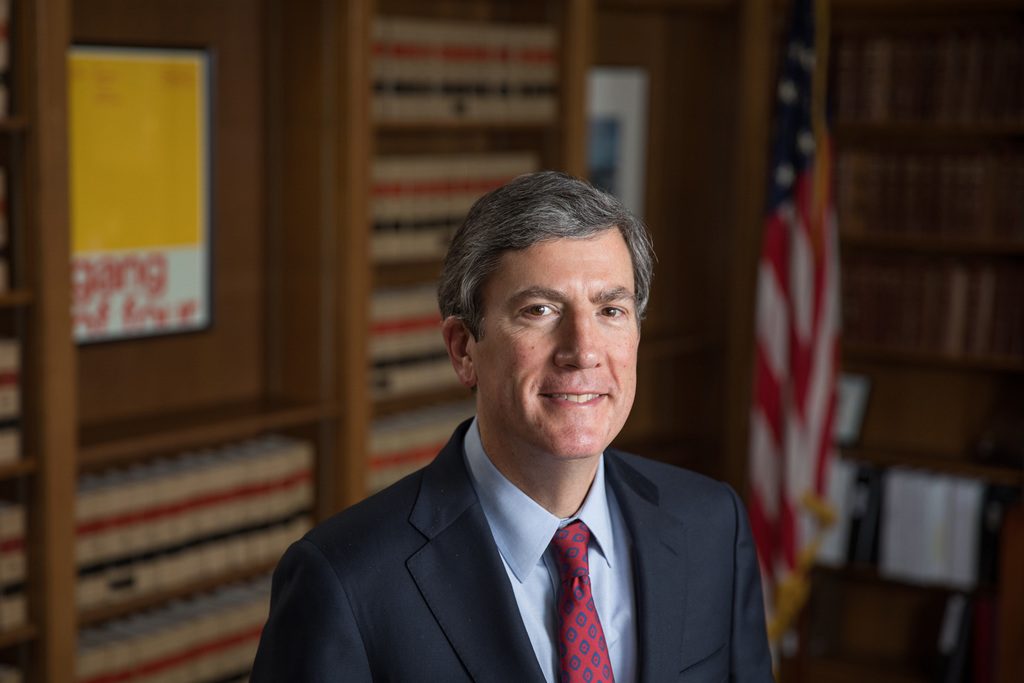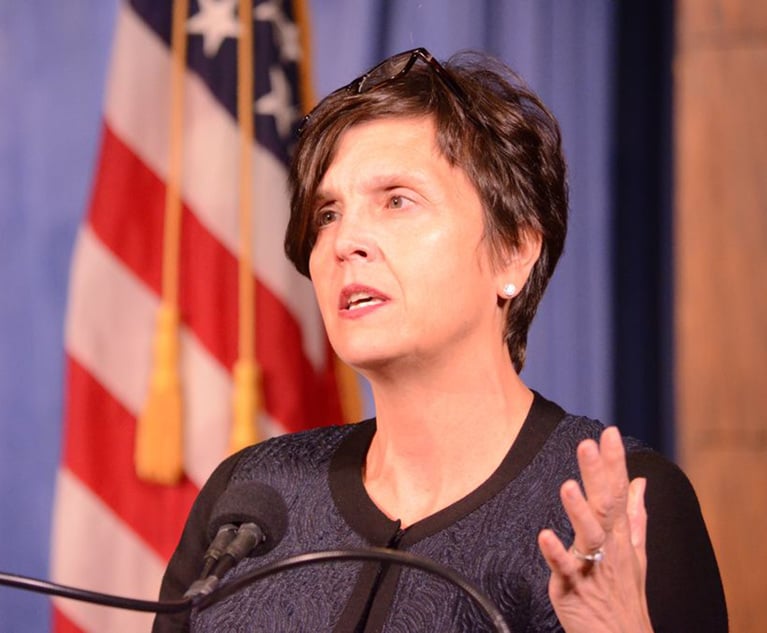Federal Judge Sharply Questions Trump's Shift on Asylum
Judge Jon Tigar pressed the government on the number of migrants would have been "granted asylum under existing law but who would have been denied asylum under the new rule."
November 19, 2018 at 04:37 PM
4 minute read
The original version of this story was published on The Recorder
 Judge Jon Tigar, U.S. District Court for the Northern District of California (Photo: Jason Doiy/ALM)
Judge Jon Tigar, U.S. District Court for the Northern District of California (Photo: Jason Doiy/ALM)
A California federal judge grilled government lawyers Monday over a Trump administration rule barring asylum for migrants who cross the southern border outside of ports of entry, specifically focusing on whether the change will affect asylum-seekers with legitimate cases and if it conflicts with earlier rules set by Congress.
In the hearing, Judge Jon Tigar of the U.S. District Court for the Northern District of California pushed both sides on whether a recent proclamation from President Donald Trump and an interim final rule from acting Attorney General Matthew Whitaker and Department of Homeland Security Secretary Kirstjen Nielsen would impact migrants who would have been “granted asylum under existing law but who would have been denied asylum under the new rule” and whether there is a correlation between weak asylum cases and non-port of entry crossings that justifies the new rule.
Tigar wanted to know how many migrants would have been “granted asylum under existing law but who would have been denied asylum under the new rule” and whether there is a correlation between weak asylum cases and non-port of entry crossings that justifies the new rule.
American Civil Liberties Union lawyer Lee Gelernt, who represented the nonprofit plaintiffs, said that about 6,000 of the asylum cases granted last would not have been granted under the Trump administration's new rule. He said that many migrants with legitimate asylum cases cross the border between ports because they don't know the correct entry spot or are forced to another location by cartels.
Gelernt also argued that the new rules violate the Immigration and Nationality Act set by Congress, which state that asylum-seekers can enter the country outside of ports of entry.
The Trump administration, represented by Department of Justice Civil Division Deputy Assistant Attorney General Scott Stewart, said the new rule does not conflict with Congress' because asylum-seekers can still enter the U.S., if it's done through a designated port.
A similar hearing was also held in district court in Washington, D.C., on Monday.
Tigar pushed back on Stewart's argument, asking how the government “makes a distinction between Congress saying you can apply for asylum, regardless of whether you came in at a port of entry” and the president and attorney general saying, “We can deny asylum on the same ground.”
“If the rule is valid, what's left of that congressional intent?” Tigar asked.
Stewart also argued that the nonprofit groups, East Bay Sanctuary Covenant, Al Otro Lado, Innovation Law Lab and the Central American Resource Center in Los Angeles, who are also represented by the Southern Poverty Law Center and Center for Constitutional Rights, lack standing, as none of them are migrants affected by the new rule.
Stewart said that negative impacts to funding the groups have claimed as injury are speculative, as the suit was filed just hours after Trump's proclamation on Nov. 9.
Gelernt said the plaintiffs have standing and that “organizations are routinely allowed to file these types of lawsuits” because the new rule could force them “to rearrange their entire organization.” Gelernt said he believes they also have third-party standing for unaccompanied children being denied applications for entry at ports of entry in Mexico.
The ACLU lawyer estimated Tigar would make his decision by Monday afternoon. If he grants the TRO, the next step could be a quick preliminary injunction hearing, followed by an appeal by either side to the U.S. Court of Appeals for the Ninth Circuit. Gelernt said his ultimate goal is a permanent injunction against the Trump administration's asylum rule.
This content has been archived. It is available through our partners, LexisNexis® and Bloomberg Law.
To view this content, please continue to their sites.
Not a Lexis Subscriber?
Subscribe Now
Not a Bloomberg Law Subscriber?
Subscribe Now
NOT FOR REPRINT
© 2025 ALM Global, LLC, All Rights Reserved. Request academic re-use from www.copyright.com. All other uses, submit a request to [email protected]. For more information visit Asset & Logo Licensing.
You Might Like
View All
Skadden and Steptoe, Defending Amex GBT, Blasts Biden DOJ's Antitrust Lawsuit Over Merger Proposal
4 minute read
'Lack of Independence' or 'Tethered to the Law'? Witnesses Speak on Bondi
4 minute read
Trending Stories
- 1White & Case KOs Claims Against Voltage Inc. in Solar Companies' Trade Dispute
- 2Avantia Publicly Announces Agentic AI Platform Ava
- 3Shifting Sands: May a Court Properly Order the Sale of the Marital Residence During a Divorce’s Pendency?
- 4Joint Custody Awards in New York – The Current Rule
- 5Paul Hastings, Recruiting From Davis Polk, Adds Capital Markets Attorney
Who Got The Work
J. Brugh Lower of Gibbons has entered an appearance for industrial equipment supplier Devco Corporation in a pending trademark infringement lawsuit. The suit, accusing the defendant of selling knock-off Graco products, was filed Dec. 18 in New Jersey District Court by Rivkin Radler on behalf of Graco Inc. and Graco Minnesota. The case, assigned to U.S. District Judge Zahid N. Quraishi, is 3:24-cv-11294, Graco Inc. et al v. Devco Corporation.
Who Got The Work
Rebecca Maller-Stein and Kent A. Yalowitz of Arnold & Porter Kaye Scholer have entered their appearances for Hanaco Venture Capital and its executives, Lior Prosor and David Frankel, in a pending securities lawsuit. The action, filed on Dec. 24 in New York Southern District Court by Zell, Aron & Co. on behalf of Goldeneye Advisors, accuses the defendants of negligently and fraudulently managing the plaintiff's $1 million investment. The case, assigned to U.S. District Judge Vernon S. Broderick, is 1:24-cv-09918, Goldeneye Advisors, LLC v. Hanaco Venture Capital, Ltd. et al.
Who Got The Work
Attorneys from A&O Shearman has stepped in as defense counsel for Toronto-Dominion Bank and other defendants in a pending securities class action. The suit, filed Dec. 11 in New York Southern District Court by Bleichmar Fonti & Auld, accuses the defendants of concealing the bank's 'pervasive' deficiencies in regards to its compliance with the Bank Secrecy Act and the quality of its anti-money laundering controls. The case, assigned to U.S. District Judge Arun Subramanian, is 1:24-cv-09445, Gonzalez v. The Toronto-Dominion Bank et al.
Who Got The Work
Crown Castle International, a Pennsylvania company providing shared communications infrastructure, has turned to Luke D. Wolf of Gordon Rees Scully Mansukhani to fend off a pending breach-of-contract lawsuit. The court action, filed Nov. 25 in Michigan Eastern District Court by Hooper Hathaway PC on behalf of The Town Residences LLC, accuses Crown Castle of failing to transfer approximately $30,000 in utility payments from T-Mobile in breach of a roof-top lease and assignment agreement. The case, assigned to U.S. District Judge Susan K. Declercq, is 2:24-cv-13131, The Town Residences LLC v. T-Mobile US, Inc. et al.
Who Got The Work
Wilfred P. Coronato and Daniel M. Schwartz of McCarter & English have stepped in as defense counsel to Electrolux Home Products Inc. in a pending product liability lawsuit. The court action, filed Nov. 26 in New York Eastern District Court by Poulos Lopiccolo PC and Nagel Rice LLP on behalf of David Stern, alleges that the defendant's refrigerators’ drawers and shelving repeatedly break and fall apart within months after purchase. The case, assigned to U.S. District Judge Joan M. Azrack, is 2:24-cv-08204, Stern v. Electrolux Home Products, Inc.
Featured Firms
Law Offices of Gary Martin Hays & Associates, P.C.
(470) 294-1674
Law Offices of Mark E. Salomone
(857) 444-6468
Smith & Hassler
(713) 739-1250











